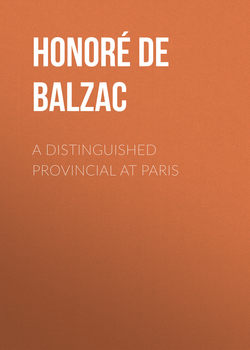Читать книгу A Distinguished Provincial at Paris - Оноре де'Бальзак, Honoré de Balzac, Balzac - Страница 4
PART I
“EVE.”
Оглавление“My darling,” the mother wrote, “I can only add my blessing to all that your sister says, and assure you that you are more in my thoughts and in my prayers (alas!) than those whom I see daily; for some hearts, the absent are always in the right, and so it is with the heart of your mother.”
So two days after the loan was offered so graciously, Lucien repaid it. Perhaps life had never seemed so bright to him as at that moment; but the touch of self-love in his joy did not escape the delicate sensibility and searching eyes of his friends.
“Any one might think that you were afraid to owe us anything,” exclaimed Fulgence.
“Oh! the pleasure that he takes in returning the money is a very serious symptom to my mind,” said Michel Chrestien. “It confirms some observations of my own. There is a spice of vanity in Lucien.”
“He is a poet,” said d’Arthez.
“But do you grudge me such a very natural feeling?” asked Lucien.
“We should bear in mind that he did not hide it,” said Leon Giraud; “he is still open with us; but I am afraid that he may come to feel shy of us.”
“And why?” Lucien asked.
“We can read your thoughts,” answered Joseph Bridau.
“There is a diabolical spirit in you that will seek to justify courses which are utterly contrary to our principles. Instead of being a sophist in theory, you will be a sophist in practice.”
“Ah! I am afraid of that,” said d’Arthez. “You will carry on admirable debates in your own mind, Lucien, and take up a lofty position in theory, and end by blameworthy actions. You will never be at one with yourself.”
“What ground have you for these charges?”
“Thy vanity, dear poet, is so great that it intrudes itself even into thy friendships!” cried Fulgence. “All vanity of that sort is a symptom of shocking egoism, and egoism poisons friendship.”
“Oh! dear,” said Lucien, “you cannot know how much I love you all.”
“If you loved us as we love you, would you have been in such a hurry to return the money which we had such pleasure in lending? or have made so much of it?”
“We don’t lend here; we give,” said Joseph Bridau roughly.
“Don’t think us unkind, dear boy,” said Michel Chrestien; “we are looking forward. We are afraid lest some day you may prefer a petty revenge to the joys of pure friendship. Read Goethe’s Tasso, the great master’s greatest work, and you will see how the poet-hero loved gorgeous stuffs and banquets and triumph and applause. Very well, be Tasso without his folly. Perhaps the world and its pleasures tempt you? Stay with us. Carry all the cravings of vanity into the world of imagination. Transpose folly. Keep virtue for daily wear, and let imagination run riot, instead of doing, as d’Arthez says, thinking high thoughts and living beneath them.”
Lucien hung his head. His friends were right.
“I confess that you are stronger than I,” he said, with a charming glance at them. “My back and shoulders are not made to bear the burden of Paris life; I cannot struggle bravely. We are born with different temperaments and faculties, and you know better than I that faults and virtues have their reverse side. I am tired already, I confess.”
“We will stand by you,” said d’Arthez; “it is just in these ways that a faithful friendship is of use.”
“The help that I have just received is precarious, and every one of us is just as poor as another; want will soon overtake me again. Chrestien, at the service of the first that hires him, can do nothing with the publishers; Bianchon is quite out of it; d’Arthez’s booksellers only deal in scientific and technical books – they have no connection with publishers of new literature; and as for Horace and Fulgence Ridal and Bridau, their work lies miles away from the booksellers. There is no help for it; I must make up my mind one way or another.”
“Stick by us, and make up your mind to it,” said Bianchon. “Bear up bravely, and trust in hard work.”
“But what is hardship for you is death for me,” Lucien put in quickly.
“Before the cock crows thrice,” smiled Leon Giraud, “this man will betray the cause of work for an idle life and the vices of Paris.”
“Where has work brought you?” asked Lucien, laughing.
“When you start out from Paris for Italy, you don’t find Rome half-way,” said Joseph Bridau. “You want your pease to grow ready buttered for you.”
The conversation ended in a joke, and they changed the subject. Lucien’s friends, with their perspicacity and delicacy of heart, tried to efface the memory of the little quarrel; but Lucien knew thenceforward that it was no easy matter to deceive them. He soon fell into despair, which he was careful to hide from such stern mentors as he imagined them to be; and the Southern temper that runs so easily through the whole gamut of mental dispositions, set him making the most contradictory resolutions.
Again and again he talked of making the plunge into journalism; and time after time did his friends reply with a “Mind you do nothing of the sort!”
